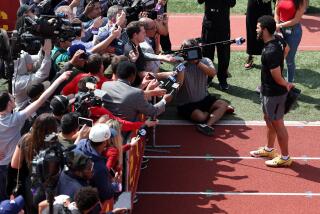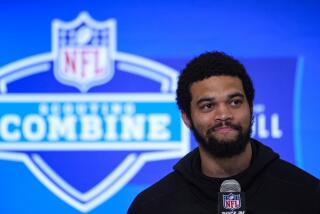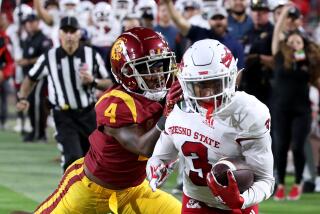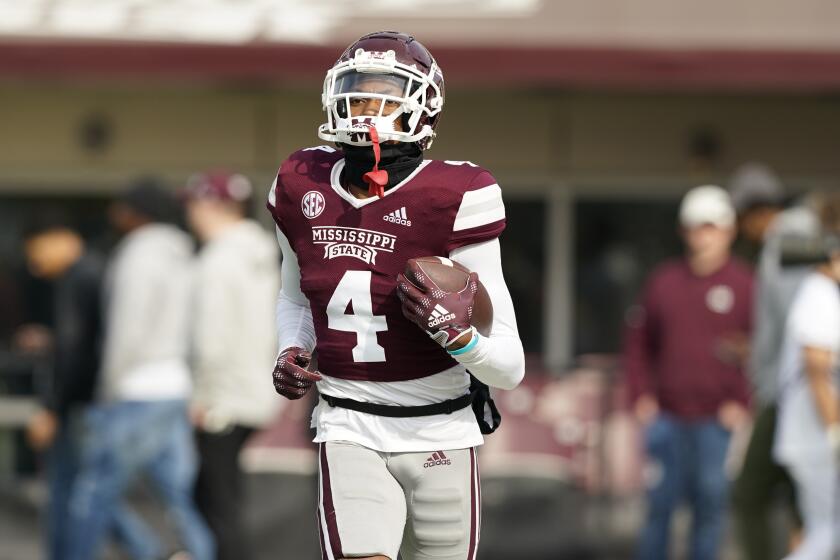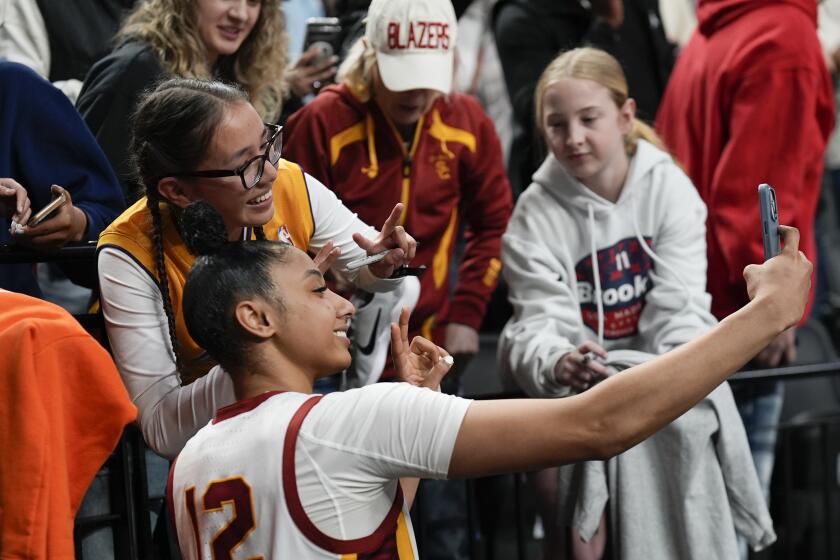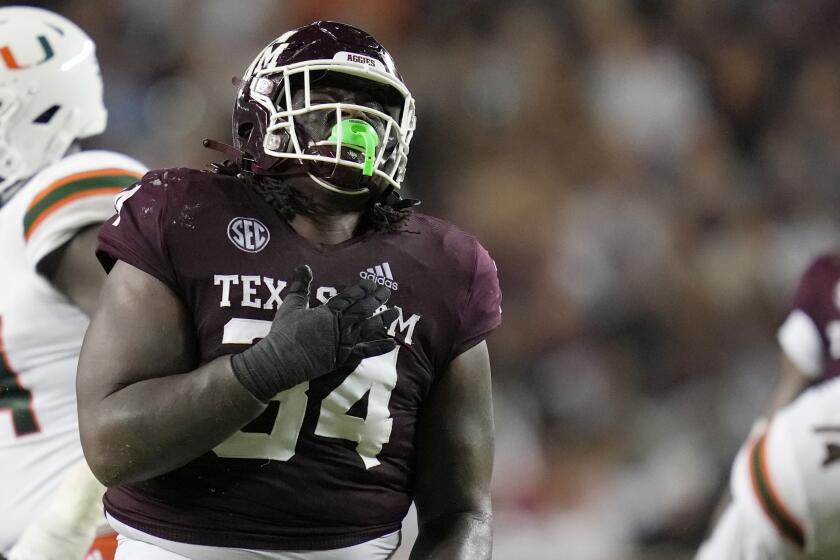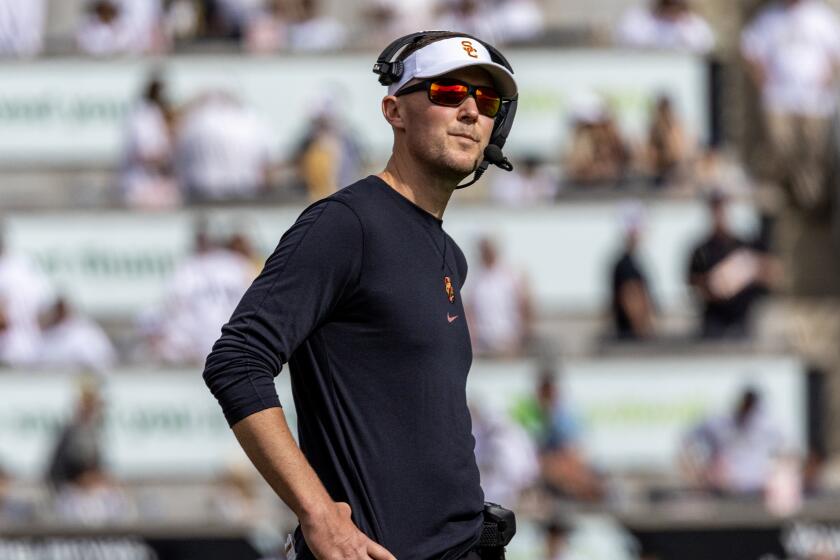USC’s Matt Barkley weighs costs, benefits of injury insurance
Matt Barkley left millions of dollars on the table when he decided to stay at USC and postpone turning pro.
Now, as a projected top-five pick in the 2013 NFL draft, he is eligible for insurance policies that would pay as much as $10 million if he suffers a career-ending injury.
But the Trojans quarterback might not purchase protection for the 2012 season.
Barkley’s father said Friday that he is continuing to explore the option, but after initially researching the issue and considering the advances in medical science that make true career-ending injuries rare, the family was leaning toward forgoing insurance.
“Given what we believe to be the remote possibility of the disability-insurance policy actually paying off,” Les Barkley said, “we don’t believe, fundamentally, that the cost-benefit makes sense.
“Fortunately, this is something we don’t have to decide today.”
The quarterback’s father was not making blind comments. He works mainly in international business development but also is a licensed life insurance agent.
Insurance against career-ending injuries has been available to elite college athletes for decades through private underwriters such as Lloyd’s of London and since 1990 through the NCAA.
Premiums for policies secured through private insurers can range from $7,000 for $1 million of coverage to $80,000 for $10 million, according to Keith Lerner, a chartered life underwriter and financial consultant based in Gainesville, Fla. Lerner also noted that premiums have fallen in the last five years.
Tim McDonald, father of All-American safety T.J. McDonald, said he too is leaning toward not investing in a policy for his son, who is back for his senior season.
Tim McDonald is a former USC All-American and NFL All-Pro. Like Les Barkley, he cited advances in medicine and the rarity of career-ending injuries.
Nevertheless, many players regarded as top NFL prospects purchase insurance.
Stanford quarterback Andrew Luck, who will lead the Cardinal in the Fiesta Bowl and is the presumed No. 1 pick in the 2012 draft, reportedly played this season with policies totaling well above the $5-million maximum available through a program sponsored by the NCAA.
Lerner has secured insurance policies for college athletes for nearly 25 years and acknowledged that the percentage of those who suffer career-ending injuries is small.
“But the reality is that there are still those injuries that cannot be repaired or fixed,” Lerner said. “If that happens to be you, then it’s 100%.”
The NCAA covers all athletes for catastrophic injury and offers the Exceptional Student-Athlete Disability Insurance (ESDI) program, which was introduced to ward off the influence of unscrupulous sports agents, said Juanita Sheely, the NCAA’s associate director for travel and insurance.
The program is underwritten by a private firm and is available to football and men’s hockey players who are projected to be selected in the first three rounds of the NFL or NHL drafts. Basketball and baseball players projected as first-round picks in the NBA, WNBA or major league baseball drafts also qualify.
Football and men’s basketball players are eligible to buy policies for a maximum of $5 million. Baseball and men’s hockey players are eligible for up to $1.5 million in coverage, women’s basketball players $250,000.
About 100 student-athletes participate annually, 80% to 85% of them football players, Sheely said.
Premiums for policies, for terms of 12 to 18 months, are about $5,000 to $8,000 for $500,000 of coverage and up to $40,000 for the maximum of $5 million, Sheely said.
In the NCAA program, athletes can secure financing for a loan through U.S. Bank in Cincinnati. Repayment is not due until the athlete signs a pro contract, exhausts his eligibility or collects a payout after suffering an injury.
Because career-ending injuries are rare, Sheely said, fewer than 10 policyholders have received payouts in the history of the program.
Despite the low odds of quarterbacks suffering career-ending injuries, Carson Palmer’s father, Bill, bought policies for the 2002 Heisman winner through Lloyd’s in 2001 and 2002. Bob Leinart, father of 2004 Heisman winner Matt Leinart, purchased policies for his son in 2004 and 2005.
Now, with his son preparing for a potential run at the Heisman, Les Barkley will have to decide.
“We’ll delve into it one more time,” he said, “before the season starts.”
twitter.com/latimesklein
More to Read
Go beyond the scoreboard
Get the latest on L.A.'s teams in the daily Sports Report newsletter.
You may occasionally receive promotional content from the Los Angeles Times.
